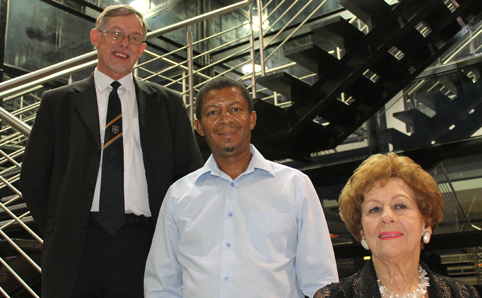Latest News Archive
Please select Category, Year, and then Month to display items
14 June 2024
|
Story Anthony Mthembu
|
Photo Suplied
 Jeremiah Hlahla, a UFS student completing his PhD in Botany at the University of Debrecen as part of an exchange initiative funded by the Erasmus+ Mobility Programme.
Jeremiah Hlahla, a UFS student completing his PhD in Botany at the University of Debrecen as part of an exchange initiative funded by the Erasmus+ Mobility Programme.
As part of an exchange initiative facilitated by the Erasmus+ Mobility Programme, Jeremiah Hlahla, a student at the University of the Free State (UFS), is nearing the completion of his PhD studies at the University of Debrecen in Hungary. Hlahla’s journey, which began in February 2024 and is set to conclude in July 2024, has been a remarkable learning opportunity. “As a first time-traveller to Europe, I have thoroughly enjoyed engaging with people from different countries and cultures,” he said.
The benefits of international collaboration
Hlahla is currently pursuing a PhD in Botany, focusing on plant stress physiology. “My current PhD project investigates the physiological, biochemical and morphological responses of vegetable-type soybean, or edamame, to combined drought and heat stress,’’ he explained. He considers the University of Debrecen the ideal institution to complete his research due to its extensive expertise and resources in similar projects. He noted that his colleagues at Debrecen conduct significant work on plant protection against biotic and abiotic stresses, including salt and drought stress, as well as proteins and amino acids in barley and other legumes.
Given the vast knowledge available on similar projects, Hlahla has found substantial engagement with his work at the University of Debrecen. “Upon arrival, I delivered an introductory lecture presenting my UFS project on the synergistic effects of combined drought and heat stress on the physiology and biochemistry of edamame. It was an engaging session as everyone could relate to my work and asked many questions,’’ he said.
Insights gained from the exchange
Hlahla has also gained valuable lessons that will assist him in his research career, including biotechnology and physiology tools. “I learned how to prepare samples and use high-performance liquid chromatography (HPLC) and reversed-phase ultra-high-performance liquid chromatography (UHPLC) to quantify proteins and amino acids,’’ he said. These techniques are beneficial not only for his current work but will also support future soybean research.
As his experience at the University of Debrecen nears its end, Hlahla reflects on the collaborations and friendships he has formed, which stand out as a significant highlight.
Two new buildings for Health
2012-03-06
 |
|
The James Moroka building and the Muller Potgieter building of the Faculty of Health Sciences were officially taken into use in February this year. Present at the ceremony was from left Prof. Gert van Zyl, the Dean of the Faculty of Health Sciences, Mr Benjamin Moroka, son of Dr James Moroka, and Mrs Mari Potgieter, wife of Dr Muller Potgieter.
Photo: René-Jean van der Berg
06 March 2012
|
The university of the Free State boasts two new modern buildings on the Bloemfontein Campus that were erected specially for the Faculty of Health Sciences.
The James Moroka building and the Muller Potgieter building were officially taken into use recently. Family members of Dr Moroka and Dr Potgieter were present and unveiled the cornerstone.
The Faculty of Health Sciences experienced a growing shortage of office space and lecture halls on campus. To address the situation, the grounds of the old vehicle pool were used to construct the buildings. Its prime location – opposite the faculty’s existing building – was a bonus.
The National Department of Higher Education and other interested parties worked together to construct the buildings in as short a time as possible. The buildings have been in use since the beginning of the year.